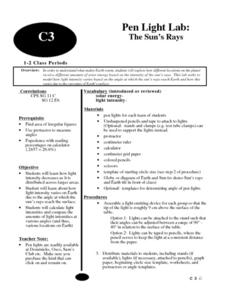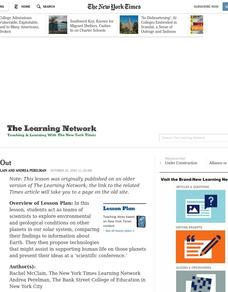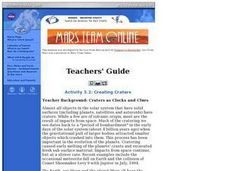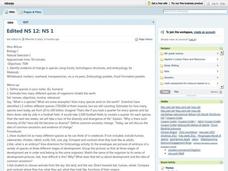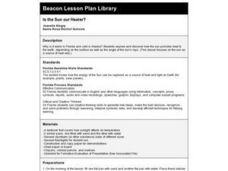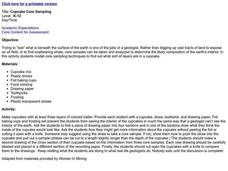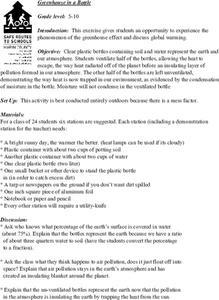Curated OER
Energy: The Big Picture
Pupils research about energy related topics. In this earth science lesson, students discuss ways to save energy. They create a presentation about their research and share it with the class.
Curated OER
Pen Light Lab
Students study what makes Earth warm and explore how different locations on the planetreceive different amounts of solar energy based on the intensity of the sun's rays. They calculate light intensities and compare the
amounts of light...
Curated OER
Comparison of hometown life with that of life in a Canadian city
Students research cultural characteristics of a Canadian city with that of their home town. They complete a map handout, providing the relative location on a large map and the absolute location on a provincial map. Students work together...
Curated OER
Planets in Proportion
Students apply estimation strategies and proportional reasoning to determine a scale comparing the planetary bodies to Earth. They convert measurements of time and distance using scientific notation. Both the metric and customary units...
Curated OER
Spacing Out
Learners explore environmental and geological conditions on other planets in our solar system, comparing their findings to information about Earth. They propose technologies that might assist in supporting human life on those planets.
Curated OER
2005 Submarine Ring of Fire Expedition: Unexplored
Students compare and contrast submarine volcanoes at convergent and divergent plate boundaries, infer kinds of living organisms that may be found around hydrothermal vents, and describe ways in which scientists may prepare to explore...
Curated OER
Creating Craters
Students explore parts of an impact crater and compare and contrast craters found in Earth, the Moon, and Mars. Crater formation is modelled and the relationship of mass, velocity, and size of the projectile to the crater formation is...
Curated OER
Saturn’s Moons
Students compare Saturn's moons to the Earth's moon. In this moon instructional activity students work in groups and complete a lab activity then answer questions.
Curated OER
Is There Water on Mars?
Students decide whether or not there is or has even been water on Mars. They analyze temperature and pressure data from the Pathfinder mission to Mars, and then they analyze images of Mars, interpreting the landforms they see and...
Curated OER
Natural Selection
Students estimate how many different species of organisms inhabit the Earth. In groups, they match the pictures of embryos at the different stages of development. They compare and contrast animals from the sky, land, and water and...
Curated OER
Shake, Rattle, and Roll: Mt. St. Helens - Lesson Plan 2
Students compile information on volcanic activity at Mount St. Helens. In this earth science lesson, students use the information they gathered on Mount St. Helens to answer questions and create charts in Excel. Then students compare...
Curated OER
Astronomy and Me: Moons Over New Haven
Third graders study the features of different moons orbiting the planets. In this astronomy lesson, 3rd graders explore the different phases of the moon using an interactive online website. They compare and contrast the features of the...
Curated OER
Why Do We Have Night?
Students engage in a fun, creative way to discover how the Earth moves. This instructional activity helps students explain why there is day and night. It can also create curiosity to further study the solar system and eclipses!
Curated OER
What Were Dinosaurs Like?
Students view a video clips about Dinosaurs. In this dinosaur lesson, students begin to understand the extinction of the dinosaurs by comparing them to contemporary animals. Students complete a research sheet on one dinosaur by...
Curated OER
IS THE SUN OUR HEATER?
Students explore and discover how the sun provides heat to the earth, depending on the surface as well as the angle of the sun's rays.
Curated OER
Deep Gardens
Students compare and contrast deep-sea coral reefs with shallow-water coral reefs. In this underwater ecology lesson plan, students describe three types of coral and explain why scientists are concerned about the future of deep-sea coral.
Curated OER
The Great Heat Escape
Students observe a demonstration on the role of thermal conductivity in heat transfer. For this thermal conductivity lesson, students design and conduct an experiment to compare the thermal conductivity of four substances. Lesson...
Curated OER
Modeling Hot and Cold Planets
Students, in teams, design and construct models of two planets, one hot and the other cold, using a variety of materials. They attempt to create the models out of substances that will actually show the greatest temperature differences...
Curated OER
Lunar Lollipops
Students simulate the phases of the moon using a lamp and styrofoam balls. In this lunar phases lesson, students stand around a lamp and act as Earth. They hold styrofoam balls and rotate to show the phases of the moon.
Curated OER
Bad Algae!
Students explore algal blooms. In this ecosystem and health lesson, students define and describe harmful algal blooms, then discuss ways in which the impact of these algal blooms could be reduced. Students work in groups to research...
Curated OER
The Effects of Meteor Impacts
Young scholars investigate meteor impacts on the Earth's surface by using different size balls and charting their impacts, given their diameter and mass.
Curated OER
What Were Dinosaurs Like?
Learners compare and contrast dinosaurs to animals that are alive today through basic research.
Curated OER
CUPCAKE CORE SAMPLING
Students explore what is beneath the surface of the earth is one of the jobs of a geologist. Rather than digging up vast tracts of land to expose an oil field, or to find coalbearing strata, core samples can be taken.
Curated OER
Greenhouse in a Bottle
Learners create models of the greenhouse effect using recycled 2-liter bottles. They discuss how their models compares to the real greenhouse effect the earth experiences.



